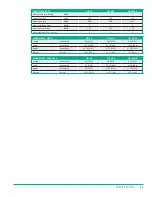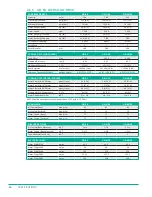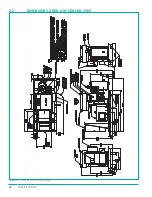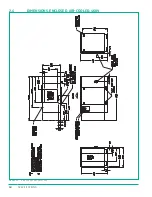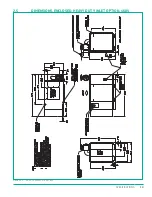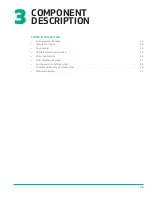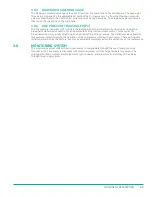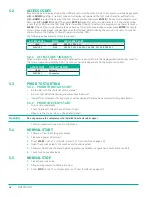
27
COMPONENT DESCRIPTION
point. The valve will automatically reset to its reset pressure point after the excess pressure is relieved. The
pressure relief valve is ASME compliant and rated at 200 psig to match the rating of the tank. It is located on
the upper side (wet side) of the sump tank.
3.5.2
COMPRESSOR DISCHARGE TEMPERATURE (CDT)
SENSOR
This sensor
controls shutdown of the compressor in the presence of high unit discharge temperature. The
sensor is preset at
220°F (104°C) for warning alarm and 240°F (116°C) for shutdown fault. The
sensor probe
is located in the compressor unit discharge outlet side port.
3.5.3
RECEIVER PRESSURE SENSOR (P1)
This sensor protects the compressor if pressure in the sump tank or compressor unit discharge exceeds the
rated pressure. This sensor is the first line of protection in the system followed by the tank relief valve. The
receiver pressure sensor also provides start-up protection against reverse rotation. If the sensor does not
identify a positive pressure at time of start-up, the compressor will shut down to protect the compressor
unit from reverse rotation (anti-start protection – ASP). This sensor is located to the right of the electrical
control panel by the pressure regulating control valve. If the compressor is equipped with optional enclosure,
removal of the access panel located to the right of the electrical control panel will expose the sensor and
regulating control valve.
3.6
AIR/OIL DISCHARGE SYSTEM
After compression, the pressurized air and oil mixture travels to the sump tank where the air and oil is
separated by change of direction and reduction in velocity. The oil is stored in the bottom portion (sump) of
the tank until it is recirculated through the system.
The remaining oil in the air is reduced to 2 ppm by the air/oil separator in the top portion of the sump
tank. Oil removed by the separator collects in the bottom pan of the element and is returned to the low
pressure side of the compressor unit by the scavenger line. After passing through the air/oil separator, the
compressed air then continues through to the minimum pressure valve (MPV).
Initially, the pressure is held by the MPV until the set point of the valve is reached. Once the minimum
pressure is met, the MPV will allow air to pass through to the aftercooler to reduce the temperature of the
air from a nominal 180°F to 100
°F (
82
°C to
38
°C). This change in temperature condenses the water so that it
can be removed by a water separator equipped with an electric drain valve. After leaving the water separator,
the compressed air can then begin building pressure in the air system for use.
3.6.1 SUMP TANK (RECEIVER)
The sump tank (also referred to as a receiver, reservoir or separator tank) collects and holds oil to be
circulated through the compressor cooling system. Air and oil discharged from the compressor unit are
separated in the sump tank by change of direction and reduction in velocity. The sump tank is an ASME
pressure vessel rated for 200
psig maximum operating pressure.
3.6.2 AIR/OIL SEPARATOR
The air/oil separator (also referred to as a separator element) separates the majority of the remaining oil in
the air before the air passes through the minimum pressure valve to the aftercooler. The air/oil separator is
located in the upper part of the sump tank under the lid.
WARNING!
DO NOT REMOVE STAPLES! The air/oil separator is supplied with staples in the gaskets to ground the
separator to the sump tank in order to prevent flash fires created by build-up of static electricity.
3.6.3 MINIMUM PRESSURE VALVE (MPV)
The minimum pressure valve maintains the minimum pressure in the sump tank necessary to circulate oil
throughout the compressor, and also prevents reverse airflow into the compressor upon unloading or
shutdown. At start-up, the valve remains closed and no output air is supplied until the minimum pressure is
reached. Once the minimum pressure is reached, the valve will open and allow air to enter the system for use.
At shutdown or unloading, a built-in check valve closes to prevent reverse airflow. The minimum pressure
valve is located on top of the sump tank lid.
3.6.4 SCAVENGER LINE (OIL RETURN LINE)
The scavenger line (also referred to as the oil return line) is a small diameter steel tube that picks up any oil
removed from the air by the air/oil separator. Oil picked up by the scavenger line passes through a sight glass
assembly containing an orifice sized for the compressor and a screen to filter the oil before it is injected back
into the compressor unit. The scavenger line is mounted to a tab located on the side of the tank. The tab
fully supports the weight of the assembly for reduced vibration.
Summary of Contents for UD Series
Page 6: ...vi About This Manual ...
Page 12: ...4 Introduction ...
Page 42: ...34 Component Description ...
Page 52: ...44 Operation ...
Page 66: ...58 Troubleshooting ...
Page 74: ...66 Parts Catalog 8 5 COMPRESSOR FRAME AND DRIVE ASSEMBLY Figure 8 1 AS801 25UD 50UD VFD R00 ...
Page 76: ...68 Parts Catalog 8 6 CONTROL ASSEMBLY OPEN Figure 8 2 1072190415 609 R00 ...
Page 78: ...70 Parts Catalog 8 7 STARTER ASSEMBLY ENCLOSED Figure 8 3 AS802 405060 PANEL R03 ...
Page 94: ...86 Parts Catalog 8 15 COOLING ASSEMBLY AIR COOLED Figure 8 11 AS804 50UDAC INLINE R00 ...
Page 100: ...NOTES ...
Page 101: ...NOTES ...

